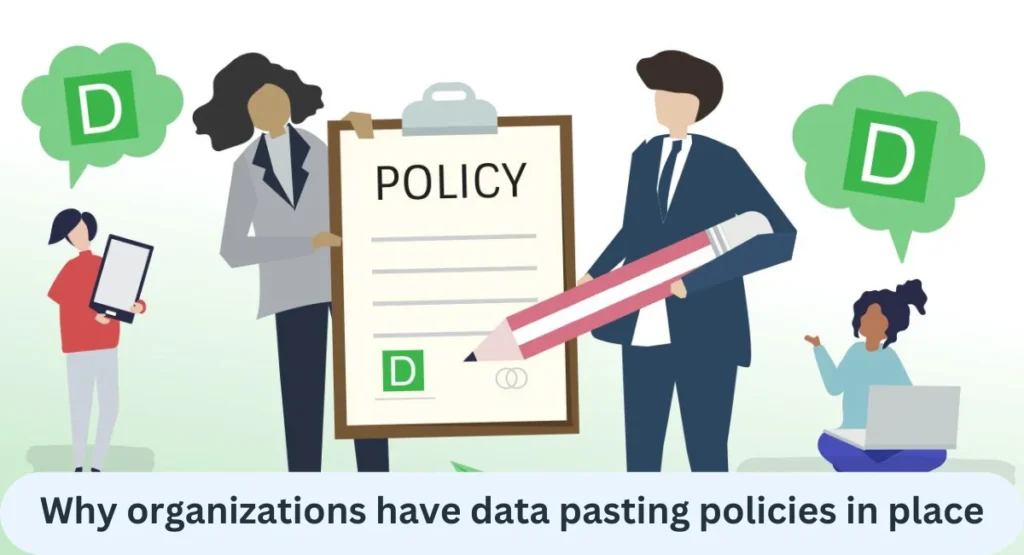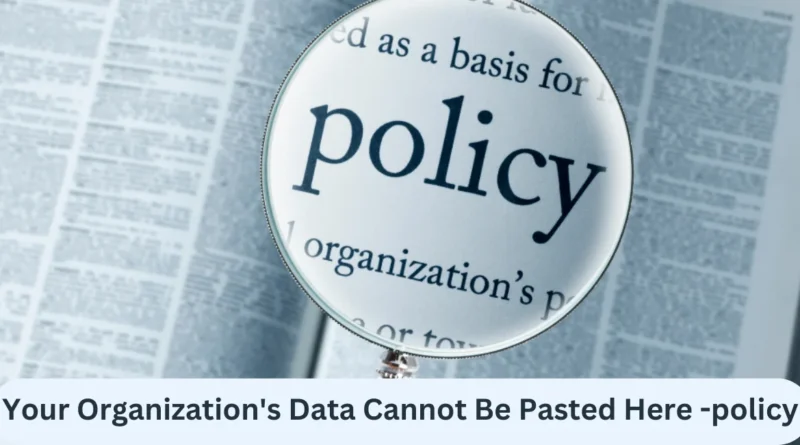Your Organization’s Data Cannot Be Pasted Here -policy
Data security is more critical than ever. Organizations are constantly grappling with the challenge of protecting sensitive information while ensuring that employees have the access they need to do their jobs effectively. One common hurdle many face is the message: “Your Organization’s Data Cannot Be Pasted Here” This error can be frustrating, but it serves as a crucial reminder of why robust data pasting policies exist.
As businesses increasingly rely on technology for daily operations, understanding these policies becomes essential. They not only help safeguard valuable information but also define how data can be shared and managed within an organization. Join us as we delve deeper into what these policies entail, their significance in maintaining security, and practical steps to navigate this often perplexing issue.
What is Your Organization’s Data Cannot Be Pasted Here -policy
The phrase “Your Organization’s Data Cannot Be Pasted Here – Policy” refers to a specific set of guidelines and restrictions within an organization. These policies aim to protect sensitive information from being improperly shared or leaked.
When employees attempt to copy data and paste it into unauthorized applications, they often encounter this message. It serves as a barrier against potential data breaches that could arise from careless handling of confidential information.
This policy is typically enforced through various security measures integrated into the organization’s software systems. By limiting where data can be pasted, organizations create a controlled environment that safeguards their intellectual property and client details.
Understanding these policies is crucial for every employee Your Organization’s Data Cannot Be Pasted Here”, as compliance helps maintain trust with clients and protects the company’s reputation in a digital landscape fraught with risks.

Why organizations have data pasting policies in place
Your Organization’s Data Cannot Be Pasted Here” implement data pasting policies primarily to safeguard sensitive information. Data breaches can lead to significant financial losses and reputational damage. By restricting how data is copied and shared, companies protect themselves from accidental leaks.
Regulatory compliance is another critical factor. Many industries are governed by strict regulations regarding data handling. A well-defined policy ensures that organizations adhere to these standards, minimizing legal risks.
Moreover, controlling data flow fosters a culture of security awareness among employees. It encourages them to think critically about the information they handle daily.
Such policies also reduce the potential for insider threats, whether intentional or not. Limiting where and how data can be pasted helps create clear boundaries around sensitive content.
In an era of increasing cyber threats, having robust controls in place is essential for maintaining organizational integrity and trust with clients and stakeholders alike.
The Importance of Data Policies for Organizations
Data policies play a crucial role in ensuring that an organization’s data is managed consistently, used properly, and protected from potential risks. Here are some key reasons why data policies are essential for organizations:
1. Managing Data Consistency and Trustworthiness:
- Effective data governance policies ensure that data is consistent, trustworthy, and not misused. This is increasingly critical as organizations rely more on data analytics to optimize operations and drive business decision-making.
2. Compliance with Regulations and Privacy Protections:
- Data policies help organizations meet compliance requirements and prevent data breaches by incorporating privacy protections into their governance efforts. With the growing impact of data privacy and compliance laws, having comprehensive data retention strategies becomes a necessity.
3. Operational Efficiency and Security:
- Implementing robust data management policies and procedures is crucial for an organization’s operational efficiency, visibility, security, and compliance. These policies ensure that data is effectively captured, accessed, stored, secured, and disposed of, leading to improved data visibility and greater organizational productivity.
4. Risk Management and Ethical Data Use:
- Data governance policies can incorporate risk management and data ethics principles to reduce potential business problems arising from the improper use of data. They also help in identifying and addressing business and security risks, ensuring the security and integrity of data at rest and in transit.
5. Legal and Financial Compliance:
- In a post-GDPR world, operating without a clear-cut data policy can pose significant legal and financial risks for organizations. The GDPR has emphasized the need for data protection policies, making them essential for ensuring compliance and avoiding penalties
6. Establishing Data Ownership and Accountability:
- Data policies clearly define data ownership, accountability, and stewardship, ensuring that responsibilities for data management and protection are well-defined across the organization. This helps in preventing ambiguity and conflicts regarding data handling and usage.
7. Building Customer Trust and Reputation:
- With strong data policies in place, organizations can demonstrate their commitment to protecting customer data and privacy. This, in turn, enhances customer trust and contributes to a positive reputation in the marketplace, fostering long-term relationships with clients and stakeholders.
8. Facilitating Effective Decision-Making:
- Well-defined data policies ensure that decision-makers have access to accurate, timely, and relevant data. By establishing guidelines for data collection, storage, and usage, organizations can empower their teams to make informed decisions based on high-quality, reliable data.
Also Read: Chosenviber.net | Crane Rental Prices | Musaris Login
How To Fix “Your Organization’s Data Cannot be Pasted Here” policy?
Dealing with the “Your Organization’s Data Cannot be Pasted Here” policy can be frustrating. First, assess your organization’s data governance strategy. Understanding the reasons behind this restriction is crucial.
Next, check if you’re using approved software or applications. Often, these policies are enforced through specific tools that restrict data sharing outside secure environments.
If you encounter issues frequently, consult your IT department. They can provide insights on potential workarounds while ensuring compliance with security measures.
Consider training sessions for employees to better understand how to navigate these restrictions effectively. This encourages a culture of awareness about data protection practices.
Review and update internal policies regularly as business needs evolve. Keeping everyone informed ensures smooth operations while maintaining robust security protocols in place.
The risks of allowing data pasting without a policy
Allowing data pasting without a clear policy opens the door to numerous risks. Sensitive information can be easily copied and shared unintentionally, leading to potential breaches.
Employees might unknowingly paste confidential client details into unsecured applications. This could expose your organization to legal liabilities.
Moreover, inconsistency in handling data increases vulnerability. Without guidelines, sensitive data may end up in wrong hands or unauthorized platforms.
Additionally, it creates an environment where employees are unaware of best practices for handling information securely. Lack of training on these policies heightens the risk even further.
Data leaks from improper pasting not only damage reputation but can also lead to financial losses. Organizations must recognize that each unregulated action has consequences that ripple throughout the business landscape.
Reasons For ‘Your Organization’s Data Cannot be Pasted Here’ Error To Occur?
The error message “Your Organization’s Data Cannot be Pasted Here” can pop up for several reasons. First, it typically arises from security settings configured by IT departments. These measures are in place to protect sensitive data.
Another common reason is the use of incompatible software or applications. Sometimes, certain platforms do not permit pasting information due to their built-in restrictions on data handling.
User permissions also play a significant role. If an individual lacks the necessary rights within the system, they may encounter this frustrating restriction.
Moreover, policies regarding external sharing can trigger this error as well. Organizations often limit where and how data can be transferred to maintain control over their information assets.
Technical glitches or software updates might inadvertently cause these errors. Regular maintenance is crucial in reducing such occurrences in digital environments.
Types of data that should be restricted from pasting
When it comes to restricting data from being Your Organization’s Data Cannot be Pasted Here typically focus on safeguarding sensitive information to maintain data security and compliance. Based on the provided search results, here are the types of data that should be restricted from pasting:
1. Confidential Data:
- Confidential data, such as employment contracts or student loan records, needs to be kept private. Exposure of this data can lead to negative ramifications for the organization .
2. Restricted Data:
- Highly sensitive data, including proprietary information, research, and data protected by state and federal regulations, should be restricted from pasting. This type of data, if leaked, could pose serious financial and legal risks .
3. Personal Information:
- Personal data, encompassing information like name, address, phone number, Social Security Number, and birth date, should be kept secure to protect individuals’ privacy .
4. Financial Information:
- Data such as credit card numbers, bank account information, and other financial records should be encrypted and held securely to prevent unauthorized access .
5. Confidential and Sensitive Numbers:
- Personally identifying numbers, such as Social Security and driver’s license numbers, fall under the category of confidential data and should be strictly controlled to prevent unauthorized access.
6. Health Information:
- Protected health information, including medical records, diagnoses, and treatment details, is subject to strict privacy regulations. Preventing the pasting of this data helps maintain patient confidentiality and compliance with healthcare laws such as HIPAA (Health Insurance Portability and Accountability Act) .
7. Intellectual Property:
- Intellectual property, such as patents, trademarks, and copyrights, represents valuable assets for organizations. Restricting the pasting of intellectual property helps safeguard these assets from unauthorized disclosure or misuse .
8. Legal Documents:
- Legal documents, such as contracts, legal correspondence, and attorney-client privileged information, should be protected from unauthorized access or disclosure to maintain legal confidentiality and compliance with attorney-client privilege laws .
Creating an Effective Data Policy for Your Organization’s Data Cannot Be Pasted Here
Creating an effective data policy for your organization involves careful consideration of data security, compliance, and user productivity. Here are some key steps and considerations based on the provided search results:
1. Understand the Root Cause:
- Investigate the specific reasons behind the “Your organization’s data cannot be pasted here” error. This may include security restrictions imposed by Microsoft Intune policy, outdated applications, or data format mismatches.
2. Policy Configuration and Management:
- Utilize Microsoft Intune app protection policies to safeguard data management on company-issued computers. Configure the Data Transfer settings to allow appropriate cut, copy, and paste actions between authorized applications while maintaining security.
3. Employee Training and Awareness:
- Provide comprehensive training to employees regarding the organization’s data policies, including the reasons behind data pasting restrictions and the importance of maintaining data security. Ensure that employees understand the implications of the policy and how it aligns with the organization’s security objectives.
4. Policy Customization:
- Customize the app protection policies in Microsoft Intune to align with the organization’s specific requirements. This may involve modifying the Restrict cut, copy, and paste settings to accommodate legitimate data transfer needs while maintaining security.
5. Compliance and Legal Considerations:
- Ensure that the data policy complies with relevant data protection laws and regulations, such as GDPR and HIPAA. This includes transparently communicating the organization’s data handling practices to employees and stakeholders.
6. Security Measures and Updates:
- Implement security measures to protect sensitive data, including updating applications to the latest versions to address compatibility issues and security vulnerabilities. This can help mitigate the risk of data breaches and ensure a secure data environment.
7. Transparent Communication:
- Communicate the data policy clearly to employees, explaining the rationale behind the restrictions and providing guidance on how to handle data securely within the organization’s ecosystem.
By following these steps and considerations, organizations can create an effective data policy that balances data security, compliance, and user productivity, while addressing the “Your organization’s data cannot be pasted here” error effectively.
Implementing and Enforcing Data Policies
Implementing and enforcing data policies requires a strategic approach. Start by clearly communicating the policy to all employees. Awareness is crucial.
Training sessions can help staff understand the importance of these policies. Use real-life scenarios to illustrate potential risks.
Regular audits ensure compliance with established guidelines. They also provide an opportunity to review and update policies as needed.
Encourage feedback from employees about the policy’s effectiveness. This fosters a culture of open communication and continuous improvement.
Utilizing technology plays a vital role too. Data loss prevention tools can automatically restrict unauthorized pasting actions, ensuring adherence without constant supervision.
Management should lead by example, demonstrating their commitment to data integrity within daily operations. This sets a standard for everyone in the organization to follow.
Benefits of Having Strong Data Policies
Strong data policies offer numerous benefits to organizations, contributing to improved data quality, enhanced decision-making, increased operational efficiency, reduced risk, and more. Here are the key benefits supported by the provided search results:
1. Improved Data Quality:
- A strong data governance framework ensures that the data being collected, stored, and used throughout an organization is accurate, consistent, and reliable. This improvement in data quality leads to better-informed strategic and operational decisions, making data a strategic asset that significantly enhances organizational performance .
2. Enhanced Decision-Making:
- When data is accurate and dependable, it becomes a strategic asset that significantly enhances organizational performance. Improved data quality ensures that decision-makers at all levels of the organization have access to accurate and reliable data, leading to better-informed strategic and operational decisions .
3. Increased Operational Efficiency:
- Strong data governance policies and procedures contribute to increased operational efficiency by ensuring that data is accurately captured, accessed, stored, secured, and disposed of. This leads to improved data visibility and greater organizational productivity 1.
4. Reduced Risk:
- Effective data governance policies help in identifying and addressing business and security risks, ensuring the security and integrity of data at rest and in transit. Additionally, strong data privacy practices protect against data breaches that can devastate a business 2.
5. Compliance and Legal Considerations:
- Strong data policies help organizations comply with data privacy and compliance laws, demonstrating a commitment to ethical business practices and building trust between the business and its customers. They also protect against severe penalties and damage to a company’s reputation resulting from poor data privacy practices or failure to comply with data privacy regulations 2.
6. Data Security and Protection:
- Data governance policies and procedures help ensure that data is secure, accessible, and held for no longer than required, contributing to comprehensive data retention strategies and strong data security measures
Also Read: Amazon Project kuiperalamalhodaitechcrunch | Sarkarisangam.com | xemphimon@gmail.com
Addressing challenges and concerns from employees about data pasting policies
Addressing challenges and concerns from employees about data pasting policies is crucial for fostering a culture of trust, transparency, and compliance within an organization. Here are some key considerations and strategies based on the provided search results:
1. Employee Awareness and Training:
- Implementing documented policies and procedures to make employees aware of data pasting restrictions is essential. Providing comprehensive training on best privacy and security practices can go a long way in building a data culture that prevents incidents.
2. Transparency and Communication:
- It’s important for organizations to prioritize the protection of employees’ personal data and ensure that the benefits of privacy policies extend beyond the customer base. Transparency in disclosing the personal data collected and processed, along with how it is being used, is crucial for building trust and addressing concerns .
3. Legal Compliance and Ethical Policies:
- Organizations should ensure that their data pasting policies comply with legal obligations and best practices related to employee data privacy. This includes providing workers with a detailed privacy policy that discloses the information collected about them and why, as required by regulations such as the CPRA (California Privacy Rights Act) .
4. Data Security Measures:
- Emphasize the importance of data security measures and the role of employees in maintaining the security of sensitive information. This includes implementing physical security, electronic security, and employee training as part of a comprehensive data security plan .
5. Addressing Privacy Concerns:
- Actively address privacy concerns related to data pasting by striking the right balance between data privacy protection and product usability. This involves implementing policy-based intelligent automation and ensuring that privacy policies are actively enforced, and employees are adequately trained .
Conclusion: Ensuring the Security and Integrity of Your Organization’s Data
The security and integrity of Your Organization’s Data Cannot Be Pasted Here are paramount in today’s digital landscape. As threats evolve, so must our approach to safeguarding sensitive information. Implementing robust data pasting policies helps mitigate risks while fostering a culture of awareness among employees.
Having clear guidelines empowers staff to understand the importance of protecting organizational data. Regular training reinforces these principles and aids in compliance. The conversation around data policies can be challenging but is necessary for long-term success.
A well-crafted policy not only protectsYour Organization’s Data Cannot Be Pasted Here from potential breaches but also enhances overall operational efficiency. Embracing these practices will pave the way for a secure future where every team member plays a crucial role in maintaining data integrity and security within the organization.



